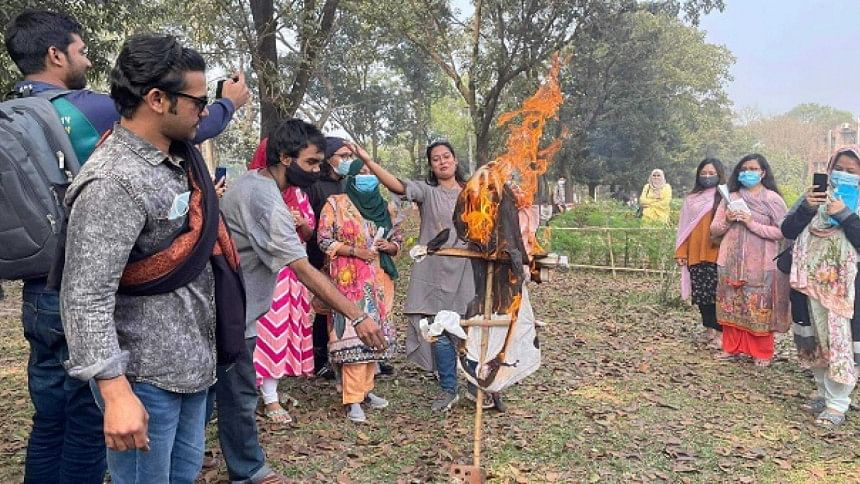Of marriage and movement: The curious case of VC Farid

Recently, on social media, the news of a comment made by the vice-chancellor of Shahjajal University of Science and Technology (SUST), Farid Uddin Ahmed, went viral. In a leaked phone conversation, he claimed that nobody wants to marry the female students of Jahangirnagar University (JU) because they stay outside till late at night. How and why the leaked conversation went viral is worth talking about. But putting that aside, this claim of his is outrageous in so many ways that I had difficulty wrapping my head around them all.
The individual in question is, after all, a serious academic and holds a powerful position. He has served in important academic and administrative positions before, such as that of Dean of the Social Sciences faculty and the Vice-Chancellor of a public university. If he did make the comment, then he must have provided support for his argument. You know, the way academics must always have a logical argument to support their claims. So in this article, I will try to analyse his hypothesis.
Evidently, this is a false hypothesis. Being a former female student of JU, I was certainly one of those students who stayed outside until late at night quite often. Still, I had many suitors and I even ended up getting married—not once, but twice. All the female JU alumni I can think of have also been married.
But, what if VC Farid's position is not about the non-suitability of female students of JU for marriage, and is instead about the non-suitability of marriage for emancipatory women? JU is undeniably famous for its history of resistance, especially against sexual harassment, rape, and many patriarchal rules (even those implemented by a female VC). The students of JU protested the discriminatory sundown curfew rule (shurjasto ain) for female students in 1993. As a result, the rule was repealed. The historic anti-rape movement at JU in 1998 and its legacy led to the nation's first anti-sexual harassment policy for institutions.
The students of JU protested against corruption in 2019, in the same way that the students of SUST are doing now. At that time, they protested against the credible accusations of corruption and misogyny against a female VC. This made us clearly aware that even a female head of administration can be sexist. The history of protesting against sexual violence and corruption gave JU a reputation for progressive dissent that none can deny. This culture of dissent is what JU alumni are proud of. The dissenting atmosphere can strengthen the students' spirit to protest any kind of inequality, including the marital one suggested by the VC.

If marriage systemically maintains the central role to strengthen patriarchy, if marriage means controlling women's freedom to decide for themselves, their sexual agency and subjectivity, their rights to property, family income or the guardianship of their children, and if education for women is a bridal qualification only, then I take his assumption as a compliment. I assume he appreciates the fact that the female students of JU moved just enough to notice the chain attached to their feet by realising that marriage is not their only aim in life. Female students do not acquire an education from JU to be pretty brides. Maybe the female students of JU have other things on their minds other than just being someone's wife? For example, female students might want to live alone, live with their partner outside of marriage, or adopt any other way of being that they deem suitable for themselves. None of these things has anything to do with a university education. University is where students become familiar with new knowledge and use this knowledge to sharpen their critical minds. If the long history of JU's student movements can motivate SUST students to raise their voices, regardless of whether they get married or not, the VC's comment is indeed a compliment.
But what if he didn't mean it as a compliment? Well, then it says more about him than about the students he was talking about. If his comment is not critical of the patriarchal way of viewing marriage as the only goal of women's higher education, then he should not hold the position of a vice-chancellor. Moreover, he needs to acknowledge that his archaic patriarchal ideas are harmful for higher education, and educate himself about social inequality as a social scientist. In fact, as a feminist anthropologist myself, I would be happy to give him a reading list to help him with this process. Otherwise, VC Farid should consider retiring, not only from the position of vice-chancellor, but from being an academic as well.
Since writing this piece, we have come to know that the VC of SUST, Farid Uddin Ahmed, has apparently apologised to the VC of Jahangirnagar University over the phone. He claimed that the audio clip in question was edited and he denied making such a statement about the female students of JU. Funnily enough, despite the news of his "apology" being disseminated via a press note from the JU authority, no press note has been released from the SUST VC's office regarding this. As a senior academic and administrator, he must realise that this does not qualify as a formal apology.
Nasrin Khandoker is associate professor of Anthropology, Jahangirnagar University, and a postdoctoral fellow at National University of Ireland, Galway.

 For all latest news, follow The Daily Star's Google News channel.
For all latest news, follow The Daily Star's Google News channel. 



Comments